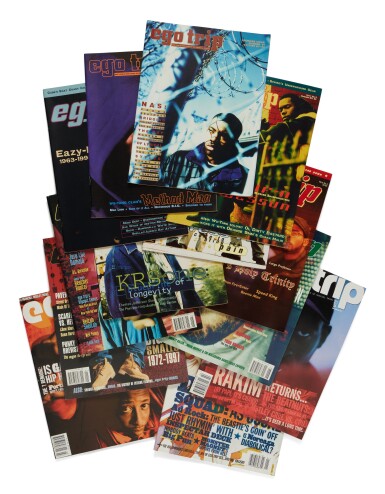The Art and Influence of Hip Hop
The Art and Influence of Hip Hop

Property from the Collection of ego trip/Ethnic Inc.
ego trip
A complete run of ego trip magazine
Lot Closed
March 30, 05:57 PM GMT
Estimate
1,000 - 1,500 USD
Lot Details
Description
A complete run of ego trip magazine, with all printed issues from Vol. 1 No. 1 (1994) through Vol. 4 No. 1 (1998).
13 issues, issue 1 printed in black ink on yellow paper, Vol. 1 No. 1-Vol. 2 No. 5 staple bound at spine, the rest bound at spine in glossy photographic wrappers.
Complete listing of issues with cover stars:
Vol. 1, Issue 1 (1994): Nas
Vol. 1, Issue 2: Method Man
Vol. 1, Issue 3: Smif-N-Wessun
Vol. 2, Issue 1 (1995): Eazy-E
Vol. 2, Issue 2: Cypress Hill
Vol. 2, Issue 3: KRS-One
Vol. 2, Issue 4: A Tribe Called Quest, De La Soul, Large Professor
Vol. 2, Issue 5: Wu-Tang/Ghostface Killah
Vol. 2, Issue 6: Redman
Vol. 3, Issue 1 (1997): Biggie Smalls
Vol. 3, Issue 2: Rakim
Vol. 3, Issue 3: Gang Starr
Vol. 4, Issue 1 (1998): Def Squad
A COMPLETE RUN OF THE CELEBRATED HIP HOP MAGAZINE FROM THE 1990S
Renowned as “The Arrogant Voice of Musical Truth,” ego trip magazine was formed and founded in New York City in 1994 by Sacha Jenkins and Elliott Wilson, with Jeff “Chairman” Mao as principal conspirator. Publishing early career profiles on the likes of Nas, Method Man, The Notorious B.I.G., Raekwon, Ghostface Killah, MF DOOM and others, ego trip was firmly ensconced at the nexus of Hip Hop’s ’90s creative explosion, cementing its reputation for obsessively knowledgeable and sardonically dispensed rap coverage while also reporting on the underground sub-cultures of and adjacent to NYC’s graffiti, skateboarding, and indie rock and hardcore punk scenes. By 1996, catalyzed by the additions of managing editor Gabriel Alvarez and art director Brent Rollins (both of whom defected from Los Angeles’s revered Rap Pages magazine to enlist in the ego trip guerilla unit) this central committee of furious five scribes had established itself as the most original collective editorial voice in Hip Hop publishing. Like Scarface and Willie D pushing a bloody-eyed but unbowed Bushwick Bill through a Houston hospital ward, they could not be stopped.
ego trip’s authoritative, impassioned and often ruthlessly critical perspective would result in a plethora of memorable features and recurring “front-of-the-book” segments. Amongst these: “Why Most Live Hip-Hop Shows Suck,” “Ignorant Rhyme of the Month,” “ego trip Ebonics,” the colorization confrontation “Light Skinded vs. Dark-Skinded: A (Sk)In-Depth Debate on Blacks in Hip Hop,” an imagined children’s board game entitled “The Rap Game” (tagline: “You Can’t Win”), legendary graffiti writer and artist Lee Quinoñes’s restaurant reviews, the advice column “Ask Mister Softee,” dearly departed NYC street photographer Ricky Powell’s regular photo journal “The Rickford Files,” and the ever popular “Count Chocula vs….” – a recurring snaps-filled Q&A between rap luminaries like Busta Rhymes, Stretch Armstrong and Fat Joe and everyone’s favorite Transylvanian cereal vampire. Meanwhile the magazine’s beloved in-house “ego trip ads” foretold the meme before memes.
Through bombastic editorials written in the voice of the magazine’s fictitious white publisher “Ted Bawno” (and occasional stories penned by his entitled but delusively “down” son, “Gaelen Bawno”), ego trip’s editorial staff surreptitiously lampooned the power structure and racial dynamics at the top of the mastheads of many mainstream “urban” publications. Yet ego trip was also fully capable of thoughtfully memorializing lost icons like Eazy-E and The Notorious B.I.G., celebrating the vibrancy of artists like Mobb Deep, Redman, Rakim and Gang Starr in the midst of career-defining moments, and conducting deep dive Q&As with the vital producers responsible for Hip Hop’s sonic landscape. ego trip’s roll call of contributors encompassed the most revered writers and editors of the era. The publication’s integrity, brutal honesty, humor, and obsession with Hip Hop minutiae would culminate in Jenkins, Wilson, Mao, Alvarez and Rollins co-authoring ego trip’s Book of Rap Lists in 1999, and the collective’s fixation with race and identity would yield ego trip’s Big Book of Racism! published in 2002.
The current lot comprises a complete run of this essential publication. Lasting only four years and thirteen issues, ego trip nevertheless established itself as one of the most crucial and critical voices of the 1990s, at once both popular and political – a delicate balance achieved by few and respected by many. Any issue of ego trip, much less the entire run featured here, is highly coveted by collectors of Hip Hop's explosive output and a magazine whose effects on the culture reverberate to this day.
Provenance:
Jeff "Chairman" Mao, Partner, ego trip
Condition Report:
To request a condition report for this lot, please contact pop@sothebys.com
